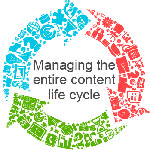Contract Management
Old vs. New Contract Lifecycle Management: A Confident Decision Beats a New Filing Cabinet

If you remember the “old days” (or maybe read about them somewhere in a textbook), you probably have visions of how offices used to look: rows and rows of file cabinets at every angle, overstuffed with documents of every kind. Finding what you needed was an exercise in … well … exercise. Bending, stooping, and getting paper cuts from searching through files, trying to find the right cabinet with the right drawer with the right file, and with a hope and a prayer that the contract you were looking for was where it was supposed to be.
Worse yet was discovering that the contract you were looking for was expired because you didn’t keep manual tabs on the renewal date. Or maybe it had been faxed so many times due to redlining, negotiation, and initialing that it was next to impossible to read.
The digitization of the business world isn’t new by any means, but every stride that is made makes it easier for each of us to do our jobs. And part of doing our jobs means embracing new methods, new software, and new ideas on a regular basis to keep ourselves and our companies profitable and productive.
Great thought leaders come with great ideas to simplify and strategize in a way that takes the routines of the day and builds them into dynamic, quick, and easy ways to get the same things done with a keystroke and a click. And professional contract management is a primary method of keeping records straight and keeping business relationships solid.
Companies that use contract lifecycle management software understand that contracts are not just a part of business, but an asset that needs to be nurtured, maintained, and structured for best results. A great contract management system is a critical part of business success. It must be easily adoptable by multiple users representing different departments and roles, be easy to maintain, have functionality that includes superior real-time reporting, online negotiation capability, automated alerts and e-signatures, and be completely customizable while simplifying contract workflow.
Every business has contracts, but it can be hard to keep a pulse on agreements that are months or years old when daily tasks demand immediate attention. The new generation of Contract Lifecycle Management (CLM) software solves this problem by tracking the entire lifecycle of contracts from inception to expiration. Choosing the right CLM solution is an important decision for your organization and can be the telling difference in utilization, compliance, and acceptance by your team.
When it comes time for your company to make the decision to move forward with a CLM solution, there are a number of factors you should evaluate to make sure your choice is the right choice for you.
- Timelines: Will the vendor guarantee they will be met?
- Accessibility: Can the software be utilized simply from a user-friendly and intimidation-free portal?
- Adoptability: Is the solution you are choosing simple enough for your team to embrace enthusiastically yet robust enough to meet the high demands of your business?
- Future costs: What will your additional costs be to receive much-needed upgrades and enhancements?
- Support: Is your vendor 100 percent dedicated to your success? Do they have the teams necessary to assist at any moment in any part of the process? Do they have a stated operation doctrine that specifies when they will be in touch once you reach out?
- Integration: Are their services proven to be effectively and seamlessly integrated with other software programs you may already have in use? What types of relationships do they have with other solutions providers?
- Functionality: Does their scope of services cover every aspect of CLM? What extra features and benefits do they have over the competition?
- Security: How do they ensure the security of your data and your accessibility to it? Can they provide documentation to support their claim?
- Experience: Why are they in the CLM business and who is on their team? Who are their customers? What is their reputation in the industry?
- Price: The first rule of purchasing is “You get what you pay for.” Does the price justify the value, efficiency, effectiveness, and productivity your team will benefit from?
Your investment in a CLM system has to be one that grows with you and provides a measurable ROI. The solutions provider you pick needs to be willing and able to be a responsive member of your team. So when making your decision, do so with the knowledge that it’s the perfect solution for your company and your team.
And at least you won’t have to buy more filing cabinets.
Want more on Contract Management Software? Browse additional articles and reviews on best contract creation tools and contract management software with Business-Software.com’s CLM resource page. Also check out the free Top 10 Contract Management report which compares pricing, features and more to select the best CLM solution for your business.





